Happy Holidays Season 2016
រីករាយថ្ងៃឈប់សំរាកចុងឆ្នាំ ២០១៦-២០១៧
Happy Holidays Season 2016-2017
រីករាយថ្ងៃឈប់សំរាកចុងឆ្នាំ ២០១៦-២០១៧
Happy Holidays Season 2016-2017
This part (86), Mr. Sophan described some pros and cons of electoral system of USA while this system is better off comparing to the existing system of Cambodia. With its complex election system employing “winner take all”, “electoral college”, and “autonomy of election body in each state” etc. have led to deepening attempt to understand this system.
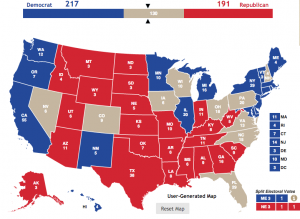 Researchers and academics agreed on this system as a not-genuine-democratic election. Those have believed in hybrid democracy than pure democracy. The United States is well-known for its leading example of democracy, but their election system doesn’t translate pure democracy. The system has truly accommodated a politics of pragmatism and necessity. Each state has its own electors (representatives) limited in numbers by the federal government (constitution?) although it is not logical as some states have more population but minimal in numbers of electors while other states less population but maximal in numbers of electors. For instance, California comprises of population over 38 million or 38,332,521 residents with 55 electors or we could approximate 696,954 for per elector, while Wyoming has about 582,658 residents with 3 electors or we could approximate only 194,219 for per elector. The “electoral college” and “winner-take-all” don’t help to symbolize a representative of direct voters (citizens) at all. Or academics call it a proportional election system of indirect democracy (sic).
Researchers and academics agreed on this system as a not-genuine-democratic election. Those have believed in hybrid democracy than pure democracy. The United States is well-known for its leading example of democracy, but their election system doesn’t translate pure democracy. The system has truly accommodated a politics of pragmatism and necessity. Each state has its own electors (representatives) limited in numbers by the federal government (constitution?) although it is not logical as some states have more population but minimal in numbers of electors while other states less population but maximal in numbers of electors. For instance, California comprises of population over 38 million or 38,332,521 residents with 55 electors or we could approximate 696,954 for per elector, while Wyoming has about 582,658 residents with 3 electors or we could approximate only 194,219 for per elector. The “electoral college” and “winner-take-all” don’t help to symbolize a representative of direct voters (citizens) at all. Or academics call it a proportional election system of indirect democracy (sic).
Hence, if we try to compare election system of the United States with Cambodia, we can see many flaws Cambodia election system is not comparable with.
– Independence of Election Committee of the United States is truly independent as their court is independent and just. This independence indicator is puzzling to see how Cambodia National Election Committee is facing pressure while the court is under government’s upper-hand.
– Financial Control Laws on Political Parties of the United States are very rigid. Each presidential candidate can raise funds to boost their campaign as such fundraising activities must comply with the laws. This financial control is imperative to ensure “level playing field” in the United States. This scenario is in contrast in Cambodia in which the government-led party has enjoyed free ride of using money to run their political activities while the opposition party is financed by donation in kind from members and using major personal expenses to cover up the ride.
This part (85), Mr. Sophan articulated on the hot debate of electoral college system of the US by exposing some pros and cons and making a comparison with Cambodia election system.
While the Presidential election is nationwide conducting in the United States, the Electoral College system is not different from party-list or proportional system of Cambodia. As Americans don’t vote for president candidate directly, Cambodians voters don’t vote for Prime Minister directly as well. Hence, each state has their own unique election system but the local representatives are having small riding base/place sizing to that of commune or ward level, not a large provincial level like in Cambodia.
Among those distinctions, the finance laws on political party especially campaigning funds for each presidential candidate has been well coped by the state. This is different from Cambodia that we are not having such mechanism in each election. And the level playing field is not existing in Cambodia.
According to national archive of the United States, Electoral College system enabling solidarity of this vast country and their Founding Father had established it within Constitution several hundreds years ago. Its aim is to ensure a-not-dividable federal United States of America.
Op-Ed: BBC
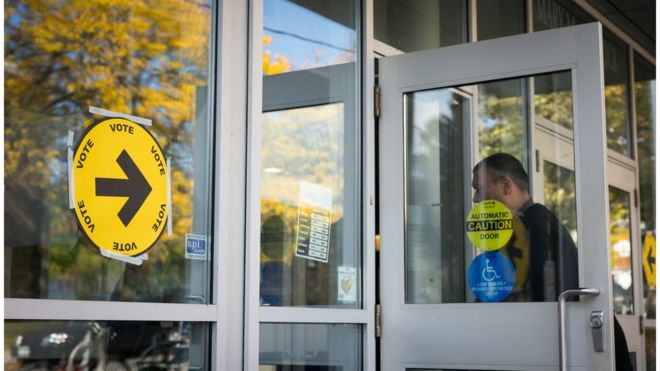 Image copyrightGETTY IMAGES NEWS
Image copyrightGETTY IMAGES NEWSCanada plans to restore voting rights to some 1.4 million expatriates.
Ottawa is introducing legislation to allow expats who have been living outside Canada for more than five years to vote in federal elections,
Two Canadians living in the US have been fighting for the right to vote after learning they were ineligible to cast ballots in the 2011 general election.
Canada’s Supreme Court is planning to hear their case next spring.
The new policy is part of a package of electoral reforms announced on Thursday by federal Democratic Institutions Minister Maryam Monsef.
Ms Monsef called the five-year limit “arbitrary”.
“People have a very strong connection to this country and to their identity as Canadians. Just because they’re living abroad doesn’t mean they’ve forgotten about this place,” she said.
The law has been in place since 1993.
Gillian Frank, currently living in Princeton, New Jersey and Jamie Duong, who resides in Fairfax, Virginia, went to court to fight against the voting rights limits after trying to register online to vote in the 2011 Canadian federal election.
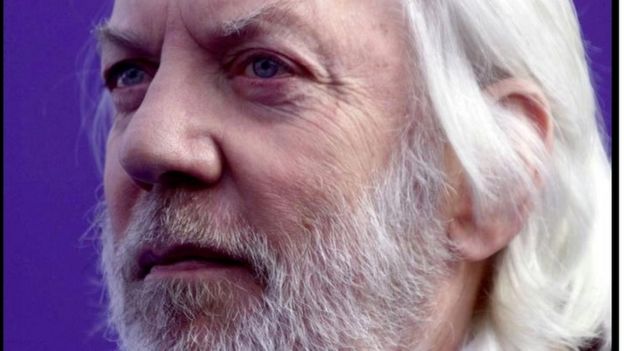 Image copyrightASSOCIATED PRESS
Image copyrightASSOCIATED PRESSIt became a hot-button issue during the 2015 federal election when an Ontario appellate court overturned an earlier win for the two expats.
Canadian actor Donald Sutherland, the father of Kiefer Sutherland, even weighed in, criticising the policy that stopped him and his wife from casting a ballot.
The lawyer for Mr Frank and Mr Duong, Shaun O’Brien, said they were heartened by the government announcement and called it “an enormous victory”.
But Ms O’Brien said they were still concerned that the appellate court ruling stated that it was constitutional to set an “expiration date” on voters abroad.
She said that meant legislation, if passed, was still “vulnerable” to being changed by a future government.
For the moment, the two are not withdrawing their challenge to the voting limits at the Supreme Court.
In 2009, there were an estimated 2.8 million Canadians living abroad.
About 11,000 Canadians living overseas, excluding armed forces members, voted in the last federal election.
Canada is not the only country that places limits on the voting rights of long-term expatriates.
Citizens who have lived outside the UK for more than 15 years are barred from voting. Two Britons who wanted to vote in the June EU referendum lost a challenge against that law earlier this year.
Australia and New Zealand also have varying voting limits for citizens who have lived abroad for extended periods.
On Thursday, the federal Liberals also proposed making it easier for people to vote within Canada by reintroducing vouching that allows one person to corroborate someone else’s identity at the polls and allowing people to use their voter information card as ID. Those provisions were controversially removed by the previous government.
Canada’s elections commission will also be allowed to pre-register Canadians between 14 and 17 years of age to vote.
This part (84), Mr. Sophan is appealing of eligible Cambodian voters to register to vote collectively in order to push for a positive change of the country. Since the election in 1993 organized by the United 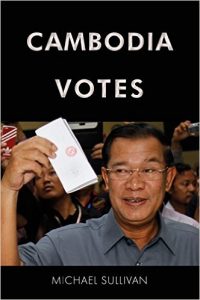 Nations, election was inclusive and nondiscriminatory by allowing all Cambodian voters to vote regardless of where they are residing. Many Cambodians overseas were able to join the election through different poling stations that UNs arranged in key cities such as New York, Paris, and Canberra etc.
Nations, election was inclusive and nondiscriminatory by allowing all Cambodian voters to vote regardless of where they are residing. Many Cambodians overseas were able to join the election through different poling stations that UNs arranged in key cities such as New York, Paris, and Canberra etc.
During this period of voters registration, our current NEC has failed itself by not making any significant decision-making to allowing or facilitating for Cambodians overseas to register to vote at all.
This inability is a failure to respect the will of the people from all walks of life. Hence, the worse intention of any body or party who has worked hard to manipulate the result of election, that doesn’t reflect the will of the voters, should not be vital to the dignity and survival of that person or part at all.
២៥ ឆ្នាំកន្លងមកនេះដែលប្រជាពលរដ្ឋខ្មែរនៅក្រៅប្រទេសត្រូវបានគេដកហូតសិទ្ធិចូលរួមបោះឆ្នោតទាំងស្រុង។ អ៑ុនតាក់បានរៀបចំអោយពលរដ្ឋខ្មែរនៅក្រៅមានសិទ្ធិបោះឆ្នោត ប៉ុន្តែរាប់ចាប់តាំងពីឆ្នាំ១៩៩៨រៀងមក គជបដែលគេមើលឃើញថាមិនមានសមត្ថភាពនិងពោរពេញដោយភាពលំអៀង មិនសំរួលអោយខ្មែរនៅក្រៅប្រទេសបានបោះឆ្នោតទេ។ ក្នុងរដូវកាលនៃការចុះឈ្មោះបោះឆ្នោតសព្វថ្ងៃ ក៏មិនបានសំរួលអោយខ្មែរនៅក្រៅប្រទេសបានចូលរួមផងដែរ។
តើនេះជាការរំលោភសិទ្ធិពលរដ្ឋខ្មែរនៅក្រៅប្រទេសឬទេ? តើពលរដ្ឋខ្មែរដែលនៅក្រៅប្រទេសជាម្ចាស់ឆ្នោតនោះ គួរធ្វើយ៉ាងណា?
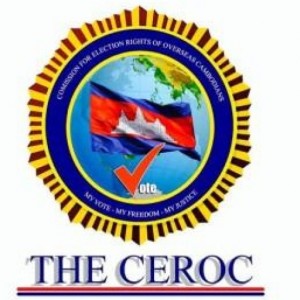 25 years has been passed that Cambodians overseas have been deprived full rights to vote in Cambodia elections. UNTAC allowed Cambodians overseas to vote, but after 1998, the new established NEC who were full of incompetency and bias didn’t allow Cambodians overseas to vote. During this season of voters registration, NEC has not facilitated for accessibility of Cambodians overseas to register vote-name.
25 years has been passed that Cambodians overseas have been deprived full rights to vote in Cambodia elections. UNTAC allowed Cambodians overseas to vote, but after 1998, the new established NEC who were full of incompetency and bias didn’t allow Cambodians overseas to vote. During this season of voters registration, NEC has not facilitated for accessibility of Cambodians overseas to register vote-name.
Is this a grave violation over rights of Cambodians overseas? And Cambodians overseas who are the owner of this right should do what next?